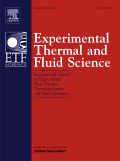
EXPERIMENTAL THERMAL AND FLUID SCIENCE
Scope & Guideline
Innovating the future of engineering through experimental research.
Introduction
Aims and Scopes
- Thermal Transport Phenomena:
Research on heat transfer mechanisms, including conduction, convection, and radiation in various systems, particularly in complex environments or under extreme conditions. - Fluid Dynamics and Flow Behavior:
Investigation of fluid flow characteristics, including turbulence, two-phase flow, and flow patterns in micro and macro scales, with an emphasis on experimental validation. - Combustion and Energy Conversion:
Studies related to combustion processes, including flame dynamics, emission characteristics, and energy conversion efficiencies, often involving alternative fuels and advanced combustion technologies. - Advanced Measurement Techniques:
Development and application of novel experimental methodologies, such as laser diagnostics, particle image velocimetry (PIV), and thermography, for measuring flow and thermal fields. - Micro and Nano-scale Thermal and Fluid Systems:
Research focusing on thermal and fluid phenomena at micro and nano scales, including applications in energy systems, microreactors, and biomedical devices. - Environmental and Industrial Applications:
Exploration of thermal and fluid systems in industrial processes, environmental contexts, and energy systems, aiming to solve practical engineering challenges.
Trending and Emerging
- Advanced Nanofluids and Hybrid Systems:
Research on nanofluids and hybrid cooling systems is on the rise, emphasizing enhanced thermal properties and efficiency in heat transfer applications. - Microfluidics and Microchannel Studies:
There is a growing interest in microfluidic systems and their applications in energy, biomedicine, and chemical processing, highlighting the need for precise control of fluid behavior at small scales. - Sustainable Energy and Alternative Fuels:
Investigation of sustainable energy solutions and the use of alternative fuels in combustion processes are trending, driven by global energy challenges and environmental concerns. - Thermal Management in Electronics:
Research focusing on thermal management solutions for electronic devices, including advanced cooling technologies and materials, is increasingly prominent due to the rise of high-performance electronics. - Data-Driven and AI-Assisted Research:
The integration of machine learning and data-driven approaches in experimental thermal and fluid science is emerging, allowing for more efficient analysis and prediction of complex phenomena.
Declining or Waning
- Conventional Heat Exchanger Studies:
Research specifically focused on traditional heat exchangers has seen a decline, as the field shifts towards more innovative and hybrid systems that incorporate advanced materials and techniques. - Single-phase Fluid Flow Studies:
Investigations centered around single-phase flow dynamics are becoming less common, as there is a growing interest in more complex multi-phase and turbulent flow phenomena. - Low Reynolds Number Flow Studies:
Research focusing on low Reynolds number flows is diminishing, likely due to a shift towards studies that address high Reynolds number flows and their applications in real-world scenarios. - Basic Thermodynamics:
Papers focusing solely on fundamental thermodynamic principles without experimental validation or application are less frequently published, reflecting a trend towards applied research. - Static Heat Transfer Studies:
The focus on static heat transfer investigations is waning as the field moves towards dynamic and transient heat transfer phenomena that are more applicable to modern engineering challenges.
Similar Journals

Fluid Dynamics
Pioneering insights in mechanical and fluid phenomena.Fluid Dynamics is a distinguished journal that has been at the forefront of research in the field of fluid flow and transfer processes since its inception in 1966. Published by MAIK NAUKA/INTERPERIODICA/SPRINGER, this journal serves as a valuable platform for engineers, scientists, and researchers dedicated to advancing the understanding of mechanical and fluid dynamic phenomena. With a Q3 ranking in key categories such as Fluid Flow and Transfer Processes, Mechanical Engineering, and Physics and Astronomy, Fluid Dynamics holds a significant position in the academic community, attracting submissions that push the boundaries of knowledge and application. Although it does not currently offer open access options, the journal is recognized for its robust editorial standards and impactful contributions to the field, making it essential reading for anyone involved in fluid dynamics research. Given its consistent publication through to 2024, Fluid Dynamics continues to inspire innovation and collaboration in an ever-evolving scientific landscape.

FLOW TURBULENCE AND COMBUSTION
Elevating knowledge in combustion science and fluid mechanics.Flow Turbulence and Combustion is a premier peer-reviewed journal published by Springer, focusing on the intricate dynamics of fluid mechanics, turbulence, and combustion phenomena. With an impressive impact factor and categorized in the Q1 quartile across Chemical Engineering, Physical and Theoretical Chemistry, and Physics and Astronomy, this journal serves as an invaluable resource for researchers, professionals, and students engaged in these fields. Founded in 1996, it presents cutting-edge research, comprehensive reviews, and innovative methodologies that advance the understanding of turbulent flow and combustion processes. The journal's commitment to open access ensures broad dissemination of knowledge, fostering greater collaboration and advancement in scientific inquiry. Based in the Netherlands, Flow Turbulence and Combustion continues to serve as a crucial platform for reporting significant findings and developments until 2024, appealing to a global audience passionate about fluid dynamics.
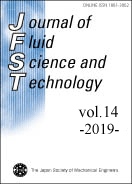
Journal of Fluid Science and Technology
Advancing the Frontiers of Fluid DynamicsThe Journal of Fluid Science and Technology, published by the Japan Society of Mechanical Engineers, serves as a pivotal platform for the dissemination of cutting-edge research in the fields of fluid mechanics and mechanical engineering. With an ISSN of 1880-5558, this Open Access journal has been dedicated to advancing the understanding of fluid flow and transfer processes since its establishment. As of 2023, it holds a significant position with a Q3 quartile ranking in both Fluid Flow and Transfer Processes and Mechanical Engineering categories. Researchers and practitioners are encouraged to explore the journal’s extensive collection of articles, contributing to the body of knowledge that impacts various practical applications in engineering and technology. The journal, which has established a reputation for quality amidst a competitive landscape, further fosters international collaboration and education by providing unrestricted access to its content. For professionals and students alike, the Journal of Fluid Science and Technology represents an invaluable resource for the latest findings and innovations in fluid dynamics and mechanical systems.
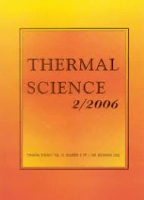
Thermal Science
Fostering collaboration in the pursuit of thermal innovations.Thermal Science is an esteemed open-access journal published by the Vinca Institute of Nuclear Sciences in Serbia. With a rich focus on the field of thermal science, this journal has established itself as a vital resource for researchers and professionals interested in the dynamics of energy, renewable energy systems, and environmental sustainability. Since its inception in 2001, Thermal Science has dedicated itself to disseminating high-quality research that addresses the challenges of contemporary thermal technologies. The journal has converged its years of publication from 2007 to 2024 and currently holds a Q4 ranking in the category of Renewable Energy, Sustainability, and the Environment, with a Scopus rank of #172 out of 270, placing it in the 36th percentile. This makes it a crucial platform for sharing innovations and findings that contribute to the development of sustainable energy solutions. With open access options available, Thermal Science ensures that knowledge is readily accessible, fostering collaboration and advancement in this critical field.

Experimental and Computational Multiphase Flow
Unlocking the Secrets of Fluid DynamicsExperimental and Computational Multiphase Flow, published by SpringerNature, is a prestigious academic journal that critically examines advancements in the field of fluid dynamics, with a specialized focus on multiphase flow phenomena. Since its inception in 2019, the journal has established a remarkable reputation, attaining Q1 status in Fluid Flow and Transfer Processes as well as Mechanical Engineering according to the 2023 category quartiles, reflecting its high impact and relevance in these domains. With Scopus rankings placing it among the top 15 journals in both Chemical Engineering and Nuclear Energy and Engineering, Experimental and Computational Multiphase Flow is an essential resource for researchers, professionals, and students engaged in cutting-edge studies and applications. Although it operates on a subscription model, the journal remains dedicated to disseminating high-quality research and fostering a deeper understanding of complex fluid interactions across various scientific disciplines. By prioritizing innovative methodologies and interdisciplinary collaborations, the journal aims to significantly contribute to the ongoing evolution of multiphase flow research, recognizing its critical importance in engineering and energy sectors.
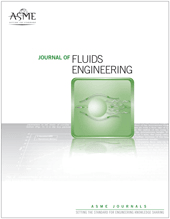
JOURNAL OF FLUIDS ENGINEERING-TRANSACTIONS OF THE ASME
Navigating the Frontiers of Fluid Dynamics ResearchJOURNAL OF FLUIDS ENGINEERING-TRANSACTIONS OF THE ASME, published by the renowned American Society of Mechanical Engineers (ASME), stands as a pivotal platform for disseminating cutting-edge research in the field of mechanical engineering, specifically focusing on fluid mechanics and its diverse applications. With an established history dating back to 1897, this journal features research that pushes the boundaries of knowledge and technology in areas such as fluid dynamics, thermal engineering, and hydrodynamics. Although it is not an open-access journal, it maintains rigorous peer-review standards, ensuring the publication of high-quality scholarly articles that contribute to the academic and professional community. In the latest rankings, it holds a respectable position within the Q2 category of mechanical engineering journals, reflecting its significant impact, as evidenced by its Scopus rank of #204 out of 672, placing it in the 69th percentile. Researchers, professionals, and students alike will find this journal to be a vital resource for the latest developments and innovative insights in fluids engineering.
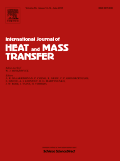
INTERNATIONAL JOURNAL OF HEAT AND MASS TRANSFER
Advancing the Frontiers of Heat and Mass Transfer ResearchINTERNATIONAL JOURNAL OF HEAT AND MASS TRANSFER is a premier, peer-reviewed academic journal published by PERGAMON-ELSEVIER SCIENCE LTD, focusing on the vital fields of condensed matter physics, fluid flow, and transfer processes, as well as mechanical engineering. With an impressive impact factor and consistently ranked in the Q1 quartile across multiple engineering and physics categories, this journal stands out for its rigorous scholarship and relevance to advancements in heat and mass transfer phenomena. Spanning from 1960 to 2024, it serves as a critical platform for researchers and professionals aiming to disseminate innovative findings and foster cutting-edge discussions in these interconnected domains. Though it operates on a subscription model, readers benefit from a comprehensive archive that covers seminal studies and contemporary advancements. Academics and practitioners alike can deepen their understanding of the complex interplay between heat and mass transfer, which is essential for numerous applications in engineering and scientific research.

Propulsion and Power Research
Leading the Charge in Open Access Research.Propulsion and Power Research, published by KEAI PUBLISHING LTD, is a leading Open Access journal that has been advancing the field of propulsion and power systems since its inception in 2012. With its commitment to fostering scientific discourse and innovation, the journal has gained a prominent position within academia, achieving a Q1 ranking in multiple categories such as Aerospace Engineering, Automotive Engineering, and Fluid Flow and Transfer Processes as of 2023. With an impressive ranking of #18 out of 153 in Aerospace Engineering and consistent recognition in the Scopus rankings, the journal explores critical advancements and research findings that propel the industry forward. As an Open Access publication, it ensures that groundbreaking research is readily available to a broad audience, enhancing collaboration between researchers, practitioners, and students. The journal's scope encompasses a wide range of topics within propulsion and energy solutions, making it an essential resource for anyone keen on discovering significant developments in this dynamic field.

HEAT TRANSFER RESEARCH
Innovating Insights in Heat Transfer and Fluid FlowHEAT TRANSFER RESEARCH is a leading academic journal published by Begell House Inc that focuses on the dynamic and evolving fields of heat transfer, fluid flow, and mechanical engineering. With an ISSN of 1064-2285 and an E-ISSN of 2162-6561, this journal serves as a critical platform for researchers and professionals seeking to disseminate innovative findings and advancements in these interrelated disciplines. Covering converged years from 1992 to 2024, HEAT TRANSFER RESEARCH has established its impact in the academic community, achieving a 2023 ranking of Q3 in Condensed Matter Physics and Q2 in Fluid Flow and Transfer Processes. It currently occupies a percentile rank ranging from 44th to 54th across several Scopus categories, underscoring its relevance and contribution to the scientific discourse. While Open Access options are not available, the journal remains committed to providing high-quality research and insights that shape the future of thermal sciences. Accessible to both seasoned professionals and aspiring students, HEAT TRANSFER RESEARCH is indispensable for anyone looking to stay ahead in the ever-changing landscape of engineering and applied physics.

Heat Transfer
Innovating heat transfer research for real-world applications.Heat Transfer, published by WILEY, is a leading open-access journal dedicated to advancing the field of heat transfer science, encompassing innovative research and application across various domains. With an ISSN of 2688-4534 and an E-ISSN of 2688-4542, the journal aims to provide a platform for researchers to disseminate their findings from 2020 to 2024, focusing on condensed matter physics and fluid dynamics. Ranked in the Q2 category for both Condensed Matter Physics and Fluid Flow and Transfer Processes, it showcases articles that contribute significantly to the understanding and utilization of heat transfer mechanisms. Located in the United States at 111 River St, Hoboken, NJ 07030, the journal appeals to a diverse audience, including academic researchers, professionals in engineering, and students seeking to deepen their knowledge in thermal sciences. With a strong emphasis on accessibility, Heat Transfer promotes the exchange of ideas and experimental techniques, ultimately driving innovation and collaboration in the advancement of thermal management technologies.